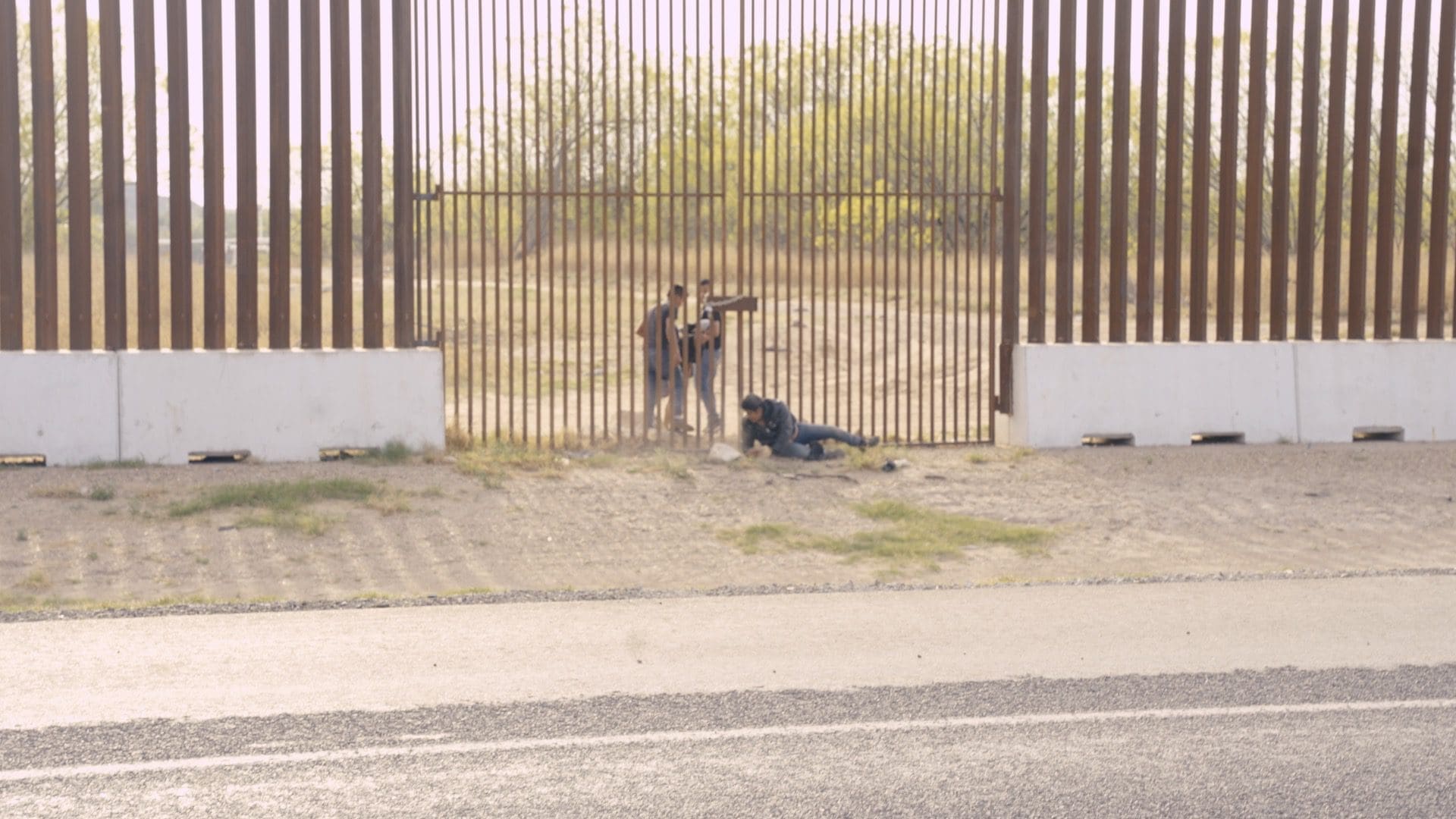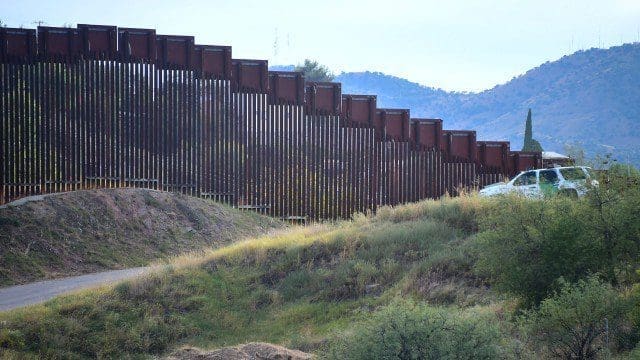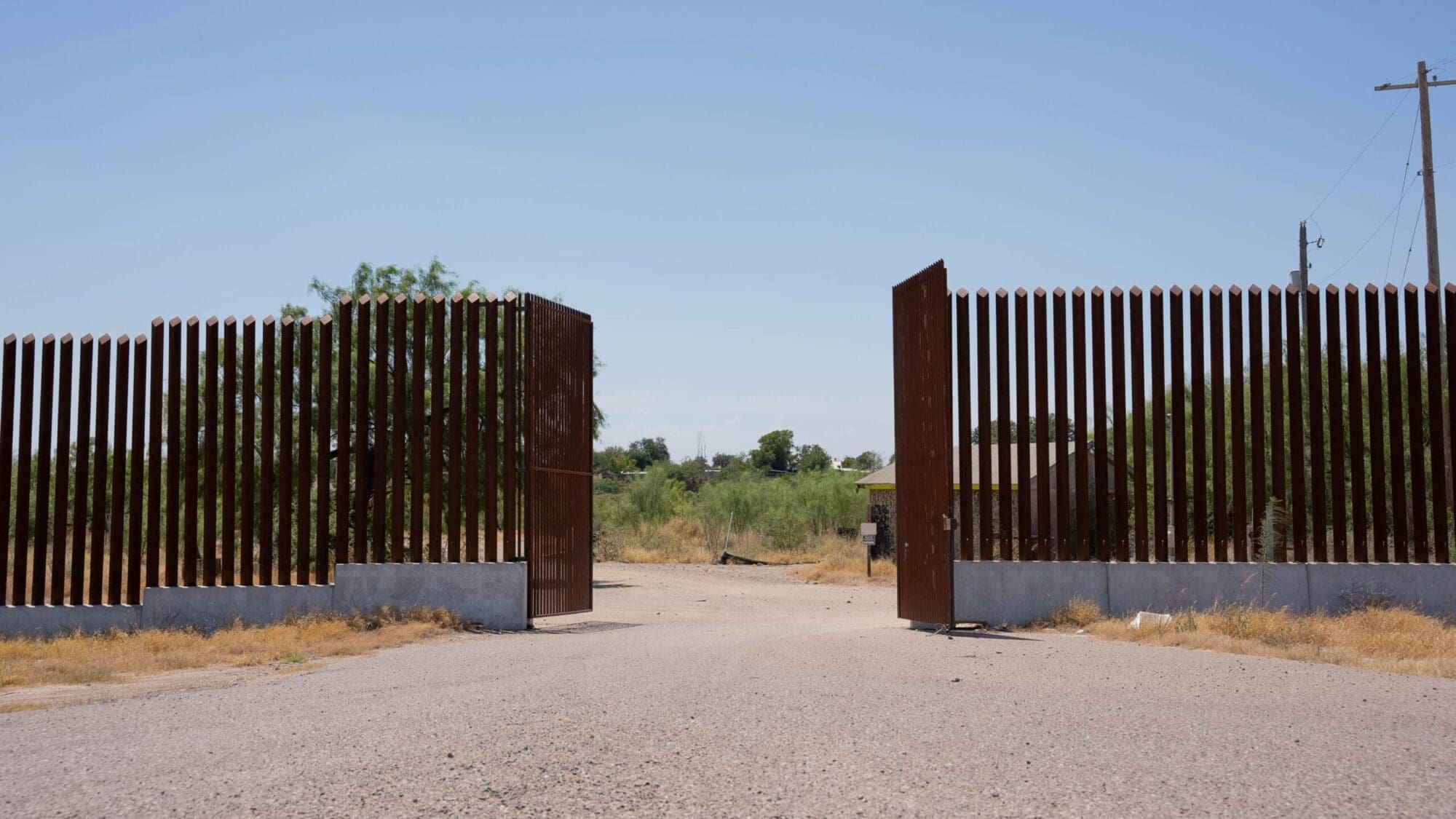As the border crisis continues, the Texas House Committee on State Affairs met until the early hours of Thursday morning to consider several pieces of potential border security legislation.
“I believe Texas will fall or not depending on what laws we pass out of here,” Kinney County Attorney Brent Smith told the committee Wednesday.
House Bill 7 by State Rep. Ryan Guillen (R–Rio Grande City) would administer and finance support programs for the southern border region, including property damage compensation as well as additional funding for the judiciary and law enforcement stretched thin by the border crisis.
“The communities and public institutions in the border region of Texas face significant strain due to immigration and criminal activity along the border,” explained Guillen, focusing on the property damage, economic damages, and strain on law enforcement and the judicial system.
“HB 7 helps address these issues through a variety of programs to assist the judicial system, law enforcement, [and] public services in health and safety,” said Guillen.
Jennefer Canales-Pelaez, attorney and strategist with the Immigrant Legal Resource Center, testified against the bill, stating, “HB 7 establishes special border protection courts that will continue to perpetrate human rights violations” and will contribute to Texas having “the most hateful laws” in the country.
Guillen clarified that the bill doesn’t establish new courts, but simply supplements existing courts.
Carine Martinez, campaign director for a Secure and Sovereign Texas at Texas Public Policy Foundation, said, “We think this bill is going in the right direction because it would create programs that will help rein in” what’s currently happening on the border.
“It’s giving the loopholes that we’ve been lacking––from the law enforcement and the judges and the prosecution side––to be able to fill the holes that are necessary to actually take care of border security,” said Sandra Whitten in favor of HB 7.
House Bill 20 by State Rep. Matt Schaefer (R–Tyler) would establish the Border Protection Unit, a new unit under the Texas Department of Public Safety that would be headquartered along the border and manage ongoing state border security operations. The chief would be appointed by the governor and report to the Public Safety Commission.
The unit would be responsible for facilitating the building and maintenance of the barrier walls along the border, deterring or repelling illegal aliens in the event of an invasion, and returning illegal aliens to Mexico when they cross illegally during a declared invasion.
A committee substitute for HB 20 addressed the challenges brought up by Texans for Strong Borders regarding language that suggested the federal government must approve of the state actions.
“HB 20 will empower the governor of Texas with legal authorities to actually deter and repel people who are attempting to illegally cross into Texas,” explained Schaefer. “The governor will be empowered to return them to Mexico.”
“What’s happening on our southwest border is an unmitigated, self-inflicted, catastrophic crisis unparalleled in modern history, a crisis that is impacting every aspect of our nation’s safety and national security,” testified former U.S. Commissioner of Customs and Border Protection Mark Morgan.
Morgan said he believed HB 20 was solid in concept but needed some additional work to really address the issues created by 7.4 million encounters and known gotaways in the past 25 months. He said the deterrence factor of detaining and removing illegal aliens was something he completely supported.
“We’re experiencing an unprecedented surge of illegal aliens crossing our southern border and costing our state $13.4 billion a year. The current administration has no interest in combating it,” said R.J. Hauman, senior counsel at Texans for Strong Borders.
“HB 20, introduced and strengthened by Representative Schaefer, rightfully acknowledges the invasion at the border and the authority of Texas to confront it,” said Hauman, urging the committee to pass the bill.
Others disagreed.
“HB 20 would codify this waste [Operation Lone Star], and it would be an expense of our communities. On the Texas Legislative website, it states,’The fiscal implications of the bill referring to HB 20, while assumed to be significant, cannot be determined at this time due to the size and scope of the Border Protection Unit being unknown.’ This is appalling,” testified Priscilla Olivarez, policy attorney and strategist with the Immigrant Legal Resource Center, against HB 20.
Olivarez also argued HB 20 “falsely criminalizes asylum seekers.”
House Bill 65 by State Rep. David Spiller (R–Jacksboro) would make unlawfully bypassing certain law enforcement checkpoints, or evading an arrest or detention, a third-degree felony, punishable by up to 10 years in prison.
Spiller says this would allow prosecutors longer to prepare for the case and “by raising the level of punishment––increased penalties––for these crimes, it makes the[m] automatically deportable under 8 USC 12.7.”
Nelson Barnes with the 402nd District Attorney’s Office raised concerns about the drain on prosecutorial resources, stating, “We will need those resources to make this work.”
Kinney County Attorney Brent Smith echoed this concern, but said, “We need all the solutions” available.
State Reps. Richard Peña Raymond (D–Laredo) and Rafael Anchia (D–Dallas) both questioned Smith on whether U.S. citizens should be prosecuted for hiring illegal aliens, apparently advocating for more use of E-Verify (a federal program to verify legal employment status).
Smith suggested that a deterrent for citizens who partake in these illegal hirings would be another possible solution.
Sadie Hernandez with the Transgender Education Network of Texas testified against the bill “because the persistent over-surveillance, over-criminalization of undocumented and immigrant folks in Texas is … violent and horrifying.”
House Bill 82 by Spiller would allow the governor to create an interstate compact on border security.
“And so this bill … is just to grant the ability for us as Texans to share resources, intelligence, and funding for border enforcement efforts with other states that wish to participate,” explained Spiller.
“We have seven other states … that are willing to sign on with the interstate compact,” testified State Republican Executive Committeewoman Kelly Perry, who has been working on the interstate compact for eight months.
Tom Glass of Texas Constitutional Enforcement also testified in favor of HB 82, stating, “Texas needs as much assistance as possible to help withstand the assaults on Texas that are coming from the cartels.”
Zachary Kolodny testified against the bill on the basis that it would formalize Operation Lone Star (Texas’ border security effort), which he says “target[s] migrants for criminal prosecution in a selective manner” comparable to “apartheid.”
House Bill 800 by Guillen would establish a mandatory minimum sentence for human smuggling convictions at 10 years, and a mandatory minimum sentence for operating a stash house at five years.
“This bill holds the smugglers accountable for their actions and for other crimes they commit in the process of smuggling,” explained Guillen.
Goliad County Sheriff Roy Boyd testified in favor of the bill but did request a caveat:
With any law that’s going to set a minimum sentencing, I would ask that there be some sort of caveat for the prosecutor. … Sometimes we flip some of the lesser smugglers in order to go after the cartel operatives who have harmed them. So, I believe that if we do not have some sort of tool by which to provide some sort of leniency for those who cooperate, then it will reduce our likelihood of actually getting the cartel operatives that we’re trying to prosecute.
Bethany Carson with Grassroots Leadership said, “We oppose this bill because it would allow migrants who are sentenced under Operation Lone Star to be imprisoned for long periods of time and prevent many from accessing asylum or other legal immigration status.”
House Bill 1600 by State Rep. Cole Hefner (R–Mount Pleasant) would create a state penalty, punishable by up to 10 years in prison, for illegal entry into the state (any entry point on the Texas-Mexico border that isn’t a legal port of entry).
“With a sharp increase in illegal border crossings in recent years, and with thousands of illegal immigrants being charged with drug and violent crimes, our bill is a necessary part of a broader solution to secure our border and make Texas a safer place to live, to work, and to raise a family,” said Hefner.
“Whether Americans realize it or not, Mexican cartels and STO’s are an existential threat to the lives, families, and futures of every citizen,” said Sheena Rodriquez, president of Alliance for a Safe Texas. “HB 1600 would directly discourage illegal crossings outside of ports of entry, thereby directly impeding the money the cartel organizations are by smuggling and trafficking individuals.”
Samantha Serna with the Mexican American Legal Defense and Educational Fund testified against the measure, saying it conflicts with the U.S. Supreme Court decision in Arizona v. U.S. and “enacting such laws will mire the state and costly unsuccessful litigation and wreak havoc on the communities that are subjected to these unconstitutional programs.”
Joshua Trevino of the Texas Public Policy Foundation testified in favor of HB 1600, explaining, “This is a good bill, a constitutional bill, and [a] necessary bill for the defense of Texas against the state cartel nexus that increasingly controls Mexico.”
Trevino contradicted Serna, saying, “Texas does possess the constitutional power to pass and enact this bill” despite the “erroneous” decision in Arizona v. U.S. that says states cannot enforce federal immigration law.
House Bill 3012 by State Rep. J.M. Lozano (D-Kingsville) would amend the human smuggling laws to allow prosecution in smuggling cases where the smuggler brought individuals through “a park, open space area, natural area, cultural resource site or area,” without the effective consent of the owner.
“Human smuggling is a major problem in South Texas,” said Lozano. “In fact, the border prosecution unit has estimated there have been nearly 14,000 cases in the border region in the last two years. While the current statute includes agricultural lands, that does not permit prosecutors to prosecute cases on park lands such as state parks.”
Charles Maley of South Texans Property Rights Association testified in favor of HB 3012, stating, “This bill aims to correct an unintended consequence of that successful effort [last session] by making it a felony for cartel guys to cross neighboring agricultural lands. The current statute leaves an opening [of] parks, open space areas, natural areas, and cultural resource sites as easy areas to continue those illegal activities, [which] isn’t necessarily a logical continuation of last session’s work to protect visitors to those areas.”
Zachary Koldony also testified against HB 3012, stating, “I think this is very dangerous legislation as part of the effort by Governor Abbott to create a patchwork of laws to persecute immigrants, and that’s why I oppose it.”
House Bill 3782 by Guillen would establish a border security advisory council to advise the governor and the Legislature on border security activities and initiatives.
The council would be composed of the House speaker, lieutenant governor, and four lawmakers from each chamber, as well as the heads of the Texas Department of Public Safety, the Texas Military Department, the Texas Division of Emergency Management, the Texas Parks and Wildlife Department, the Texas Department of Criminal Justice, the Texas Office of Court Administration, and any other members as determined by the governor.
According to Guillen, the council would evaluate border security initiatives for cost effectiveness as well as provide coordination for the state’s border security efforts.
Guillen said he would address concerns that were raised about the political and geographical composition of the council, with members and citizens seeking to ensure Republicans, Democrats, and border communities were represented.
Selene Rodriguez with the Texas Public Policy Foundation testified in favor of the bill, stating, “House Bill 3782 can provide specialized expertise in strategic guidance as well as providing clarity and purpose in this mission. … Establishing this council can also provide more clarity to Texas taxpayers that fund this important mission.”
Roberto Lopez with the Texas Civil Rights Project testified against HB 3782, stating, “If we’re so concerned about smuggling, if we’re so concerned about sex trafficking and the individuals who are impacted, why are they not part of the conversation? Why aren’t organizations that try to help women, non-binary individuals, part of the conversation? Why aren’t immigration organizations part of the conversation?”
House Bill 4670 by State Rep. Tracy King (D–Uvalde) would establish a grant program to compensate agricultural property owners for damages caused by trespassers.
King said there are “ranches or landowners that have vehicles running through their fences and smuggling every single day, so livestock gets out on the road.”
“We’re just simply looking for a way for the landowners to get some relief and some help [with] different property damages––fences, buildings, equipment, things like that––that get torn up in this process,” explained King.
State Republican Executive Committeewoman Kelly Perry testified in favor of HB 4670, stating that in her area of South Texas, “there are people that have full-time employees just to fix the fences.”
“I actually know people who are leasing ranches in other areas because they can’t keep the animals in on their own,” added Perry.
“I have a friend [and] his fence has been driven through 61 times this year alone,” testified Kinney County resident Rhonda Marquardt in favor of HB 4670.
“On my property, I had goats. I don’t run goats,” said Marquardt. Turns out, the goats had come “from five properties over because they had cut all of the fences between highway 90 and our property.”
“It’s a constant thing. It’s something that we’ve lived with for over two years,” concluded Marquardt.
The Texas GOP has made securing the border and protecting Texans one of eight legislative priorities for the session.
All bills were left pending before the committee.
No ads. No paywalls. No government grants. No corporate masters.
Just real news for real Texans.
Support Texas Scorecard to keep it that way!





